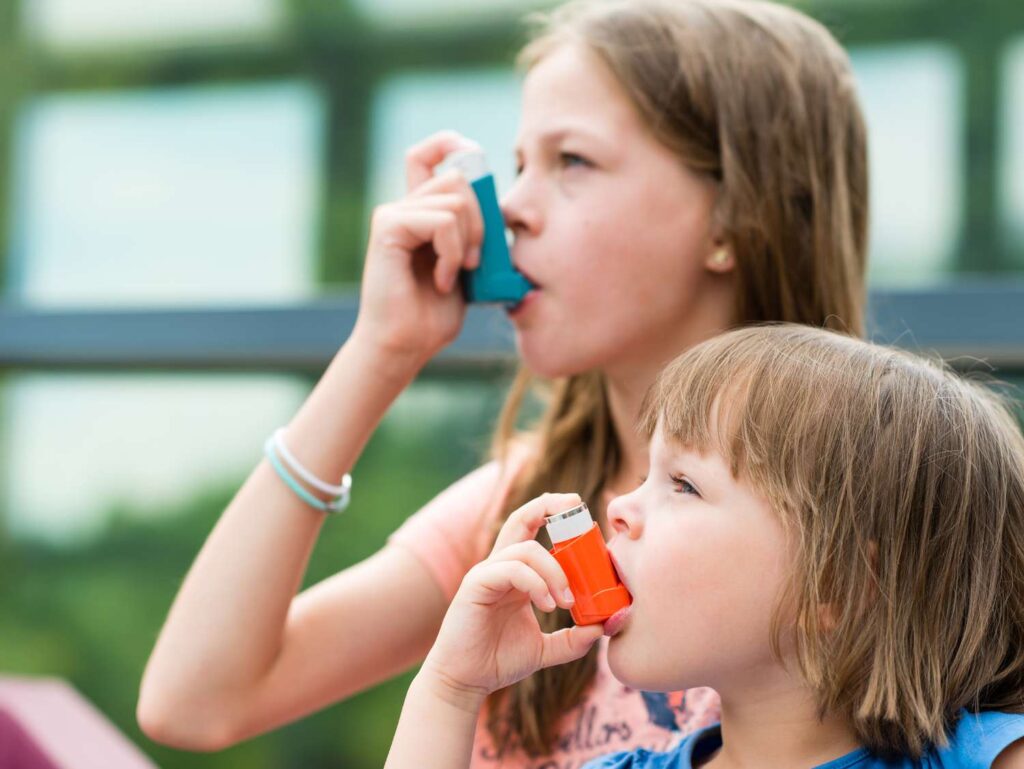Childhood Asthma - Symptoms, Causes, Prevention & Homeopathic treatment

Overview
Childhood asthma is a chronic inflammatory condition of the airways that causes episodes of wheezing, shortness of breath, chest tightness, and coughing. It affects millions of children worldwide and can significantly impact a child’s quality of life and overall health. Asthma symptoms can range from mild to severe and often vary with age and individual triggers. Effective management of childhood asthma involves a combination of medical treatment, lifestyle adjustments, and sometimes complementary therapies.
Symptoms
Asthma symptoms can vary in intensity and frequency, but common signs include:
- Wheezing: A high-pitched whistling sound during exhalation, often heard when the child breathes out.
- Shortness of Breath: Difficulty breathing, which may occur during physical activity or at rest.
- Coughing: Persistent cough, especially at night or early in the morning, which may be dry or produce mucus.
- Chest Tightness: A sensation of tightness or pressure in the chest, which can be uncomfortable or painful.
- Increased Respiratory Rate: Rapid or shallow breathing, particularly during an asthma attack.
When to See a Doctor
Consult a healthcare provider if:
- Persistent Symptoms: The child experiences frequent or severe asthma symptoms despite using over-the-counter medications.
- Difficulty Breathing: Signs of severe shortness of breath, rapid breathing, or the use of accessory muscles to breathe.
- Frequent Asthma Attacks: Increased frequency of asthma attacks or symptoms that disrupt daily activities or sleep.
- Medication Issues: Concerns about the effectiveness or side effects of prescribed asthma medications.
Early intervention and proper management are crucial to controlling asthma and preventing complications.
Causes
Asthma is caused by a combination of genetic and environmental factors:
- Genetic Predisposition: A family history of asthma or other allergic conditions increases the risk of developing asthma.
- Environmental Triggers: Exposure to allergens (e.g., pollen, dust mites, pet dander) or irritants (e.g., smoke, pollution) can trigger asthma symptoms.
- Respiratory Infections: Viral infections, particularly during early childhood, can increase the risk of developing asthma.
- Allergic Reactions: Allergies to food, mold, or certain substances can contribute to asthma symptoms.
Risk Factors
Several factors can increase the risk of developing asthma in children:
- Family History: A family history of asthma, eczema, or allergic rhinitis.
- Exposure to Allergens: Frequent exposure to indoor and outdoor allergens.
- Smoking: Exposure to tobacco smoke, either directly or secondhand, increases asthma risk.
- Premature Birth: Children born prematurely or with low birth weight are at higher risk.
- Environmental Pollution: Living in areas with high levels of air pollution or exposure to environmental toxins.
Complications
If left untreated or poorly managed, childhood asthma can lead to complications such as:
- Decreased Lung Function: Persistent inflammation can lead to long-term changes in lung function.
- Frequent Hospitalizations: Severe asthma attacks may require emergency care or hospitalization.
- Impact on Growth: Chronic asthma and the use of certain medications may affect physical growth in children.
- Emotional and Social Issues: Asthma can affect a child’s participation in physical activities and may impact self-esteem and social interactions.
Preventions
While asthma cannot be completely prevented, the following strategies can help manage and reduce the risk of exacerbations:
- Avoid Triggers: Identify and minimize exposure to known asthma triggers and allergens.
- Healthy Lifestyle: Encourage a healthy diet, regular exercise, and adequate sleep to support overall health.
- Smoking Cessation: Avoid exposure to tobacco smoke and support family members in quitting smoking.
- Regular Check-Ups: Schedule regular medical check-ups to monitor asthma control and adjust treatment as needed.
Can Homeopathy Help?
Homeopathy offers a holistic approach to managing childhood asthma, focusing on individualized treatment based on the child’s symptoms and overall health. Common homeopathic remedies for asthma include:
- Arsenicum Album: For asthma with difficulty breathing, anxiety, and restlessness.
- Spongia Tosta: For a dry, barking cough with difficulty breathing.
- Natrum Sulphuricum: For asthma triggered by damp or humid weather, with a loose cough and wheezing.
- Antimonium Tartarticum: For asthma with a rattling cough and difficulty expectorating mucus.
A professional homeopathic practitioner can tailor treatments to the specific needs of the child.
Diagnosis
Diagnosing childhood asthma typically involves:
- Medical History: Gathering information about the child’s symptoms, family history, and any known triggers.
- Physical Examination: Assessing breathing patterns, lung function, and overall health.
- Pulmonary Function Tests: Measuring lung function and airway responsiveness, often using spirometry.
- Allergy Testing: Identifying potential allergens that may trigger asthma symptoms.
Treatments
Treatment for childhood asthma generally includes:
- Medications:
- Inhaled Corticosteroids: To reduce inflammation and prevent symptoms.
- Bronchodilators: Short-acting or long-acting beta-agonists to relax airway muscles and improve breathing.
- Leukotriene Modifiers: To help control inflammation and reduce symptoms.
- Allergy Management: Avoiding allergens and using allergy medications as needed.
- Asthma Action Plan: Developing a personalized plan to manage symptoms and respond to asthma attacks.
Lifestyle and Home Remedies
Incorporating lifestyle changes and home remedies can complement traditional treatments:
- Monitor Air Quality: Use air purifiers and maintain good indoor air quality to reduce exposure to allergens and irritants.
- Maintain a Clean Environment: Regularly clean the home to reduce dust, mold, and pet dander.
- Encourage Physical Activity: Support regular, moderate exercise to improve overall lung function and health.
- Manage Stress: Implement relaxation techniques and stress management strategies to reduce the impact of emotional triggers.
Preparing for Your Appointment
To make the most of your appointment with a healthcare provider or homeopathic practitioner:
- Document Symptoms: Keep a record of asthma symptoms, including frequency, triggers, and the effectiveness of current treatments.
- List Medications: Bring a list of current medications and any changes in medication use.
- Prepare Questions: Write down any questions or concerns about diagnosis, treatment options, or management strategies.
- Share Relevant History: Provide detailed information about the child’s medical history, family history, and any known triggers.
